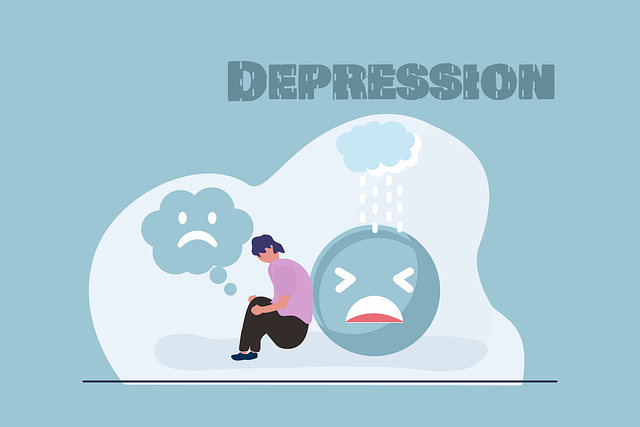Understanding mental health is crucial in designing educational programs. Breaking stigma through interactive workshops, personal narratives, and evidence-based strategies like Greenwood Village Acceptance and Commitment Therapy (ACT) encourages open discussion and help-seeking behaviors. Awareness promotion equips individuals to recognize signs, encourage positive thinking, and integrate practices like mindfulness meditation into daily routines. Empowering these skills fosters self- and other-support, contributing to a resilient community. ACT provides a framework for personalized mental health programs, promoting emotional well-being through acceptance, mindfulness, and flexible responses to thoughts and emotions. Tailored approaches cater to diverse audiences, with teens learning stress management and professionals focusing on advanced risk management. Strategic planning in Greenwood Village includes integrating ACT into schools, providing crisis intervention training, and implementing a Community Outreach Program for direct engagement and open conversations about mental wellness.
Greenwood Village is embracing a revolutionary mental health education program designed to destigmatize conversations around mental wellness. This comprehensive initiative, featuring strategies like Acceptance and Commitment Therapy (ACT), aims to empower residents of all ages.
The program breaks down complex topics into accessible learning experiences, tailored for diverse audiences. By integrating ACT techniques, it fosters acceptance, mindfulness, and goal-directed behavior, laying the groundwork for improved mental health and well-being in our vibrant community.
- Understanding Mental Health: Breaking Down Stigma and Promoting Awareness
- The Role of Acceptance and Commitment Therapy (ACT) in Program Design
- Key Components for an Effective Mental Health Education Program
- Tailoring Content for Different Audiences and Age Groups
- Implementation Strategies: Bringing the Program to Life in Greenwood Village
Understanding Mental Health: Breaking Down Stigma and Promoting Awareness

Understanding mental health is a critical first step in designing any educational program focused on this subject. By breaking down the stigma associated with mental illness, we can create an environment where individuals feel comfortable discussing their experiences and seeking help when needed. Education plays a pivotal role in shifting societal perceptions and fostering empathy. Through interactive workshops, personal narratives, and evidence-based strategies like Greenwood Village Acceptance and Commitment Therapy (ACT), participants can develop a deeper understanding of mental wellness.
Promoting awareness involves equipping individuals with the knowledge to recognize signs of common mental health issues, encourage positive thinking, and integrate practices such as mindfulness meditation into their daily routines. By empowering people with these skills, we enable them to support themselves and others effectively, ultimately contributing to a more resilient and supportive community.
The Role of Acceptance and Commitment Therapy (ACT) in Program Design

Greenwood Village Acceptance and Commitment Therapy (ACT) offers a valuable framework for designing comprehensive mental health education programs. ACT emphasizes acceptance and mindfulness, encouraging individuals to cultivate present-moment awareness and flexible responses to thoughts and emotions. This approach is particularly beneficial in fostering emotional well-being promotion techniques by helping participants develop a deeper understanding of their internal experiences.
By integrating practices like Mindfulness Meditation and Compassion Cultivation, the program can enhance overall mental resilience. These techniques allow individuals to detach from negative thought patterns, thereby reducing anxiety and depression symptoms. ACT’s focus on values clarification and goal setting enables participants to align their actions with personal beliefs, leading to enhanced motivation and purpose. This tailored approach ensures that Greenwood Village mental health education programs cater to the unique needs of each individual, promoting lasting positive changes in emotional and behavioral outcomes.
Key Components for an Effective Mental Health Education Program

An effective mental health education program should incorporate several key components to ensure it meets its objectives and positively impacts participants’ mental wellness. One such program, inspired by the Greenwood Village Acceptance and Commitment Therapy (ACT) approach, emphasizes a holistic view of mental health. This includes teaching participants how to accept their emotions without judgment, fostering emotional intelligence, and encouraging them to live in alignment with their values.
Additionally, integrating Mental Wellness Journaling Exercises and guidance on Emotional Intelligence can significantly enhance the program’s effectiveness. These practices promote self-awareness, reflection, and personal growth. Similarly, Development of Mental Wellness Coaching Programs tailored to individual needs can provide ongoing support and accountability, reinforcing learned skills long after the initial education period ends.
Tailoring Content for Different Audiences and Age Groups

Designing a mental health education program requires a nuanced approach, especially when catering to diverse audiences and age groups. The content should be tailored to meet the unique needs and developmental stages of participants, ensuring effective learning and engagement. For instance, a program aimed at high school students focusing on stress management and emotional regulation might employ interactive workshops and peer discussions to foster empathy building strategies. These activities can help young minds understand and manage their emotions better, providing them with valuable tools for anxiety relief.
In contrast, training sessions for mental health professionals in Greenwood Village would necessitate a different strategy. Here, the emphasis could be on advanced risk management planning techniques, ethical considerations, and specialized therapeutic approaches like Acceptance and Commitment Therapy (ACT). Such tailored content ensures that each audience receives relevant education, enhancing their ability to support themselves or others effectively while addressing specific challenges prevalent in their respective age groups and contexts.
Implementation Strategies: Bringing the Program to Life in Greenwood Village

In Greenwood Village, the implementation of a comprehensive mental health education program requires strategic planning and tailored approaches to ensure its effectiveness. One evidence-based method that has gained traction is Acceptance and Commitment Therapy (ACT), which focuses on fostering psychological flexibility and helping individuals live valued lives. Bringing ACT to life involves several key strategies. Firstly, integrating this therapy into local schools through a Mental Wellness Podcast Series Production can introduce teens to mental health concepts early on, reducing the stigma associated with seeking help. Crisis intervention training for teachers and staff will empower them to recognize and respond to students’ mental health crises appropriately.
Additionally, a Community Outreach Program Implementation should be initiated to engage residents directly. This could include workshops, informational sessions, and peer support groups that promote open conversations about mental wellness. By combining these implementation strategies, Greenwood Village can create a supportive environment where individuals feel equipped to manage their mental health. Such an initiative not only benefits the current residents but also sets a precedent for future generations, ensuring better access to resources and a more resilient community.
In conclusion, designing an effective mental health education program requires a multifaceted approach. By breaking down stigma through awareness campaigns, integrating evidence-based therapies like Greenwood Village Acceptance and Commitment Therapy (ACT), and tailoring content for diverse audiences, we can foster meaningful learning experiences. Implementation strategies that are sensitive to local contexts, such as those specific to Greenwood Village, ensure the program’s success in enhancing mental well-being within the community.














